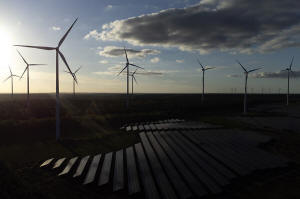Europe posts record year for clean energy use as Trump pulls US toward
fossil fuels
 Send a link to a friend
Send a link to a friend
 [January 23, 2025] [January 23, 2025]
A record 47% of the European Union’s electricity now comes from solar
and other renewables, a report Thursday said, in yet another sign of the
growing gap between the bloc's push for clean energy and the new U.S.
administration's pursuit of more fossil fuels.
Nearly three-quarters of the EU's electricity doesn't emit
planet-warming gases into the air — with 24% of electricity in the bloc
coming from nuclear power which also doesn't release greenhouse gases, a
report released by the climate energy think tank Ember found. This is
far higher than in countries like the United States and China, where
nearly two-thirds of their energy is still produced from
carbon-polluting fossil fuels like coal, oil and gas.
Experts say they’re encouraged by Europe’s fossil fuel reductions,
particularly as the U.S. looks set to increase its emissions as its new
president pledges cheaper gas prices, has halted leases for wind
projects and pledged to revoke Biden-era incentives for electric
vehicles.
“Fossil fuels are losing their grip on EU energy,” said Chris Rosslowe,
an energy expert at Ember. In 2024, solar power generated 11% of EU
electricity, overtaking coal which fell below 10% for the first time.
Clean wind power generated more electricity than gas for the second year
in a row.
2024 data wasn’t available for all countries. Ember’s data for the
world’s largest generators of electricity for 2023 show Brazil with the
largest share of its electricity from renewables, almost 89%, with much
of that coming from hydroelectric power. Canada had about 66.5%, China
30.6%, France 26.5%, the U.S. 22.7% and India 19.5%.

Green policies and war drive clean energy growth
One reason for Europe's clean power transition moving at pace is the
European Green Deal, an ambitious policy passed in 2019 that paved the
way for climate laws to be updated. As a result of the deal, the EU made
their targets more ambitious, aiming to cut 55% of the region's
emissions by the end of the decade. The policy also aims to make Europe
climate neutral — reducing the amount of additional emissions in the air
to practically zero — by 2050.
Hundreds of regulations and directives in European countries to
incentivize investment in clean energy and reduce carbon pollution have
been passed or are in the process of being ratified across Europe.
[to top of second column] |

Wind turbines spin at the Klettwitz Nord solar energy park near
Klettwitz, Germany, Oct. 15, 2024. (AP Photo/Matthias Schrader,
File)
 “At the start of the Deal,
renewables were a third and fossil fuels accounted for 39% of
Europe's electricity," Rosslowe said. "Now fossils generate only 29%
and wind and solar have been driving the clean energy transition.”
The amount of electricity generated by nuclear energy has remained
relatively stable in the bloc.
Russia's invasion of Ukraine has also spurred the move to clean
energy in Europe. Gas prices skyrocketed — with much of Europe's gas
coming from Russia becoming unviable — forcing countries to look for
cheaper, cleaner alternatives. Portugal, Netherlands and Estonia
witnessed the highest increase in clean power in the last five
years.
Europe cements its place as a clean energy leader
The transition to clean power helped Europe avoid more than $61
billion worth of fossil fuel imports for generating electricity
since 2019.
“This is sending a clear message that their energy needs are going
to be met through clean power, not gas imports,” said Pieter de Pous,
a Brussels-based energy analyst at European think tank E3G. De Pous
said the EU's origins were “as a community of coal and steel because
those industries were so important,” but it is now rapidly becoming
a “community of solar and wind power, batteries and smart
technologies.”
Nuclear growth in the bloc, meanwhile, has slowed. Across the
European Union, retirements of nuclear plants have outpaced new
construction since around the mid-2000s, according to Global Energy
Monitor.
As President Trump has pulled the United States out of the Paris
Agreement aimed at curbing warming and is pursuing a “drill, baby,
drill” energy policy, Rosslowe said the EU's leadership in clean
power becomes all the more important. “It’s about increasing
European energy independence, and it’s about showing this climate
leadership,” he said.
On Tuesday, EU chief Ursula von der Leyen said: “Europe will stay
the course, and keep working with all nations that want to protect
nature and stop global warming.”
___
Data journalist Mary Katherine Wildeman contributed from Hartford,
Connecticut.
All contents © copyright 2025 Associated Press. All rights reserved |